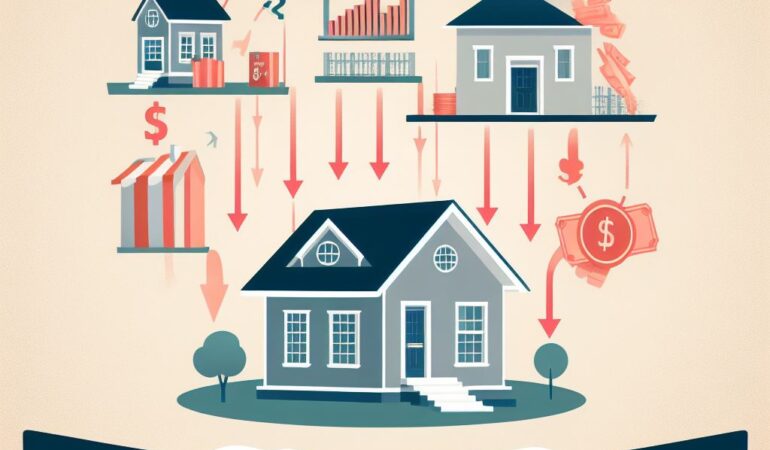If you’re considering selling a property and want to minimize your capital gains tax, then understanding the impact of 1031 exchanges is crucial.
By utilizing a 1031 exchange, you can defer paying taxes on the profits from the sale of your property. This means more money in your pocket to reinvest in a new property.
However, it’s important to be aware of the eligibility requirements and limitations of 1031 exchanges to maximize your potential tax savings.
Key Takeaways
- A 1031 exchange is a tax-deferred real estate transaction that allows you to exchange one investment property for another.
- By utilizing a 1031 exchange, you can potentially avoid paying capital gains tax on the transaction.
- The benefits of a 1031 exchange include tax deferral, diversification of your investment portfolio, accelerated wealth accumulation, and the potential for higher returns through compounding.
- To be eligible for a 1031 exchange, both properties involved must be held for investment or used in a trade or business, and certain timelines and requirements must be met.
What Is a 1031 Exchange
A 1031 exchange is a tax-deferred real estate transaction that allows you to exchange one investment property for another, potentially avoiding capital gains tax. This means that when you sell a property and use the proceeds to purchase another property of equal or greater value, you can defer paying capital gains tax on the profit made from the sale. The 1031 exchange gets its name from Section 1031 of the Internal Revenue Code, which outlines the rules and requirements for this type of transaction.
To qualify for a 1031 exchange, both properties involved must be held for investment or used in a trade or business. Personal residences don’t qualify. Additionally, the properties must be like-kind, meaning they’re of the same nature or character, even if they differ in grade or quality. The exchange must also be completed within a specific timeframe and involve a qualified intermediary to facilitate the transaction.
Benefits of Utilizing a 1031 Exchange
How can you benefit from utilizing a 1031 exchange for capital gains tax? Here are three key advantages:
- Tax Deferral:
By utilizing a 1031 exchange, you can defer paying capital gains tax on the sale of an investment property. This means you can reinvest the entire proceeds from the sale into a new property, allowing your investment to grow and compound tax-free. By deferring the tax liability, you can keep more money working for you in the short term.
- Portfolio Diversification:
A 1031 exchange provides an opportunity to diversify your investment portfolio. You can exchange your current property for a different type of real estate, such as commercial, residential, or industrial properties, allowing you to spread your investment risk across multiple sectors. Diversification can help protect your portfolio from market fluctuations and potentially increase overall returns.
- Wealth Accumulation:
Utilizing a 1031 exchange can help accelerate wealth accumulation. By deferring taxes and reinvesting the proceeds into a more valuable property, you can leverage the power of compounding and potentially generate higher returns. This can lead to increased cash flow, equity, and overall wealth over time.
By understanding the benefits of utilizing a 1031 exchange, you can make informed decisions about your investment strategy.
Now, let’s delve into the eligibility and qualifications for a 1031 exchange.
Eligibility and Qualifications for a 1031 Exchange
To determine if you’re eligible for a 1031 exchange, you must meet certain qualifications. The first requirement is that the property you’re selling and the property you’re planning to acquire must both be held for productive use in a trade, business, or for investment purposes. This means that personal residences or properties held primarily for personal use don’t qualify for a 1031 exchange.
Additionally, the properties involved in the exchange must be like-kind. This means that they must be of the same nature or character, even if they differ in grade or quality. For example, you can exchange a commercial property for another commercial property, or a rental property for another rental property.
Another qualification is that you must identify your replacement property within 45 days of selling your relinquished property. This identification must be made in writing and provided to a qualified intermediary or the person responsible for closing the transaction. You’re allowed to identify up to three potential replacement properties, or any number of properties as long as their total fair market value doesn’t exceed 200% of the value of the relinquished property.
Lastly, you must complete the exchange within 180 days of selling your relinquished property. This means that the purchase of the replacement property must be finalized within this timeframe.
Meeting these qualifications is crucial to ensure that your exchange is eligible for the tax benefits provided by a 1031 exchange. It’s recommended to consult with a qualified tax advisor or attorney to ensure compliance with all requirements.
Potential Tax Savings With a 1031 Exchange
Maximize your tax savings by utilizing a 1031 exchange for potential capital gains tax benefits. By taking advantage of this tax strategy, you can defer paying taxes on the gains from the sale of your investment property. Here are three key ways a 1031 exchange can help you save on capital gains tax:
- Tax deferral: With a 1031 exchange, you can defer paying capital gains tax on the sale of your property by reinvesting the proceeds into a like-kind property within a designated timeframe. This allows you to keep more of your investment capital working for you, potentially leading to increased returns.
- Compound growth: By deferring capital gains tax, you have the opportunity to reinvest the tax savings into a new property. Over time, this can result in compound growth as your investment continues to appreciate. This can have a significant impact on your overall wealth accumulation.
- Estate planning advantages: A 1031 exchange can also provide estate planning benefits. When you pass away, the cost basis of the property is stepped up to its fair market value, potentially eliminating the capital gains tax liability for your heirs. This can help preserve your wealth for future generations.
Understanding the potential tax savings of a 1031 exchange is crucial for making informed investment decisions. However, it’s important to consider the key considerations and limitations of these exchanges, which will be discussed in the next section.
Key Considerations and Limitations of 1031 Exchanges
To fully understand the impact of 1031 exchanges on capital gains tax, it’s important to consider some key considerations and limitations associated with these exchanges.
One key consideration is the strict timeline that must be followed. When engaging in a 1031 exchange, you have a limited window of 45 days to identify a replacement property and a total of 180 days to complete the exchange. Failure to meet these deadlines can result in disqualification of the exchange and the realization of capital gains tax.
Another important limitation is the requirement that the properties involved in the exchange must be of like-kind. This means that the properties being exchanged must be similar in nature or character, such as exchanging one commercial property for another. It’s important to note that personal residences don’t qualify for 1031 exchanges.
Additionally, it’s crucial to consider the potential boot that may result from a 1031 exchange. Boot refers to any non-like-kind property or cash received in the exchange. If boot is received, it may be subject to capital gains tax.
Lastly, it’s essential to be aware of the potential state tax implications of a 1031 exchange. While the federal government recognizes 1031 exchanges, some states don’t conform to these rules and may impose their own capital gains tax on the transaction.
Frequently Asked Questions
Are There Any Time Limitations for Completing a 1031 Exchange?
Yes, there are time limitations for completing a 1031 exchange. The IRS requires that you identify a replacement property within 45 days and complete the exchange within 180 days.
Can a 1031 Exchange Be Used for Personal Property or Only for Real Estate?
Yes, a 1031 exchange can only be used for real estate, not personal property. The purpose of a 1031 exchange is to defer capital gains tax on the sale of investment properties.
Are There Any Restrictions on the Types of Properties That Can Be Exchanged in a 1031 Exchange?
There are restrictions on the types of properties that can be exchanged in a 1031 exchange. To be eligible, both the relinquished property and the replacement property must be held for investment or used in a trade or business.
Can a 1031 Exchange Be Used to Defer Capital Gains Tax in a State With No State Income Tax?
Yes, you can use a 1031 exchange to defer capital gains tax in a state with no state income tax. This strategy allows you to reinvest the proceeds from the sale of your property into a like-kind property, deferring the tax liability.
What Are the Potential Risks or Downsides of Utilizing a 1031 Exchange?
What potential risks or downsides could you face if you utilize a 1031 exchange? Are you prepared for the complexities of tax law, potential time constraints, and limited property options?




